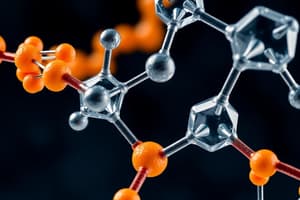Podcast
Questions and Answers
What role do carbohydrates primarily serve in the human body?
What role do carbohydrates primarily serve in the human body?
- Serving as a secondary energy reserve
- Acting as the body's primary energy source (correct)
- Providing structural support to cells
- Regulating hormone production
Which of the following is NOT a type of carbohydrate?
Which of the following is NOT a type of carbohydrate?
- Lipids (correct)
- Monosaccharides
- Disaccharides
- Polysaccharides
Which carbohydrate is a storage form of glucose in animal tissues?
Which carbohydrate is a storage form of glucose in animal tissues?
- Glycogen (correct)
- Starch
- Cellulose
- Fructose
What is the chemical formula for glucose?
What is the chemical formula for glucose?
What is the primary function of cellulose in the human diet?
What is the primary function of cellulose in the human diet?
Flashcards
Carbohydrates
Carbohydrates
A major source of energy for the human body, composed of carbon, hydrogen, and oxygen. They are found in various forms, from simple sugars to complex starches.
Monosaccharides
Monosaccharides
Simple sugars like glucose, fructose, and galactose. They are the building blocks of more complex carbohydrates.
Polysaccharides
Polysaccharides
Complex carbohydrates made up of long chains of simple sugars, such as starch, glycogen, and cellulose.
Starch
Starch
Signup and view all the flashcards
Cellulose
Cellulose
Signup and view all the flashcards
Study Notes
Carbohydrates
- Carbohydrates are a major source of energy for the human body.
- They make up only about 1% of the body's mass, but have a critical role.
- Cells release energy through oxidizing glucose, which is part of cell respiration.
- Found in foods like fruits, vegetables, and some processed items.
- Sugars like glucose, fructose, and lactose are monosaccharides.
- Sucrose (table sugar) is a disaccharide, formed from glucose and fructose.
- Starch is a polymer of glucose, stored in plants (potatoes, rice, wheat, etc) as a storage form of energy.
- Glycogen is a similar glucose polymer, stored in animal tissues (liver and muscle).
- Cellulose (a polymer of glucose) forms plant cell walls. Humans cannot digest cellulose but it's important as dietary fiber.
- Carbohydrates contain carbon, hydrogen, and oxygen, with a 2:1 ratio of hydrogen to oxygen.
Lipids (Fats and Oils)
- Lipids have the same elements (carbon, hydrogen, and oxygen) as carbohydrates, but the oxygen content is notably lower.
- Fats can be solid (like tristearin in beef and lamb) or liquid (oils).
- Lipids are a significant part of most diets.
- Examples of lipids in food include: beef, lamb and other animal products and also some fats and oils.
Studying That Suits You
Use AI to generate personalized quizzes and flashcards to suit your learning preferences.




